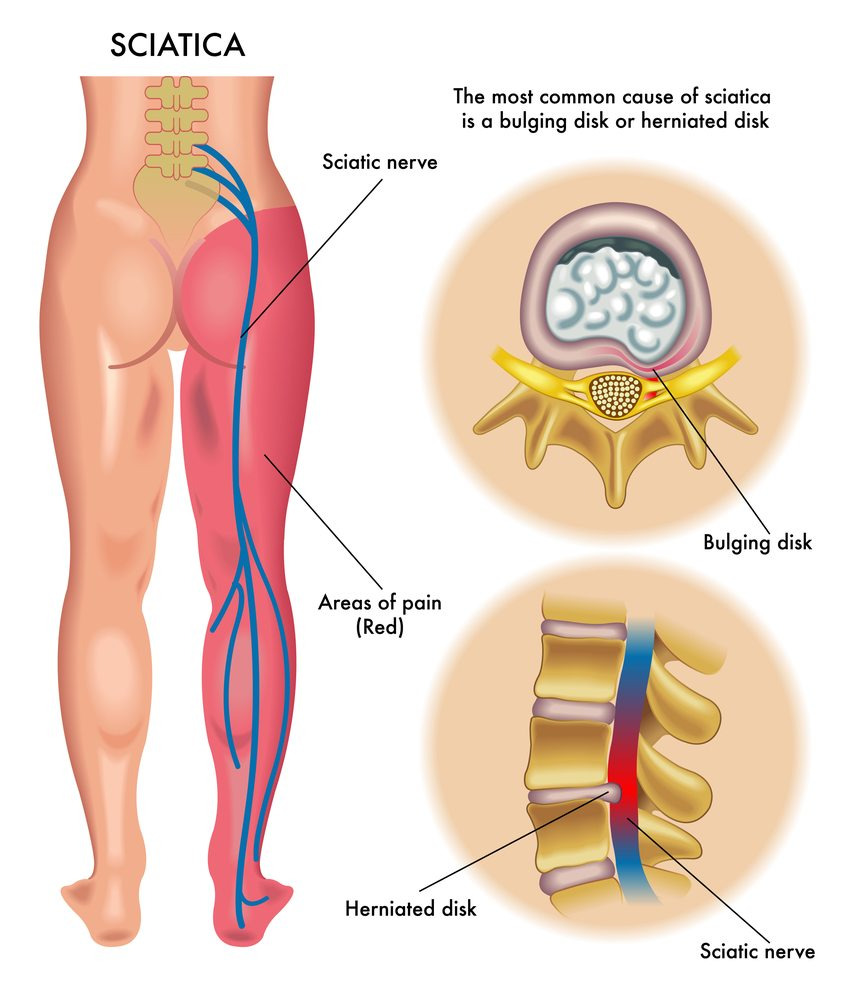If you are one of the up to 40% of people who experience sciatica during your lifetime [1], one of the first things that you probably want to know is how long sciatica lasts. Fortunately, most cases have a favourable outcome. Studies show that 75% of patients see signs their sciatica is improving within 4 weeks [1]. However, this duration differs significantly from one person to another, as for many patients, the pain can only last for a few days, while for others, sciatica can become chronic and last for months or even years.
While further research is needed to determine the predictors of your sciatica outcome, it appears that people who have intense pain which does not improve within 30 days and intensifies when sitting, sneezing or coughing may be at a higher risk of developing chronic sciatica [2] which may require surgery.
If your sciatica pain has not improved in 4 weeks, you may need a back and spine specialist. However, the NHS can’t always help you with your back pain, since the waiting times for specialist referrals can exceed 18 weeks. Fortunately, if you are self-paying or privately insured, you can book an appointment (often, on the same day) with one of the top-tier spinal specialists or pain management consultants at the Harley Street Specialist Hospital.
Keep reading this article to find out all you need to know about:
- Causes and symptoms of sciatica
- How long sciatica lasts
- Predicting factors for your sciatica outcome
- Ways to improve your sciatica pain
Table of Contents
- What is sciatica?
- What are the main symptoms of sciatica?
- How long does sciatica last?
- What factors can predict your sciatica outcome?
- Can my sciatica last forever?
- When to call a healthcare provider for sciatica
- Sciatica treatments that can speed up healing?
- What if your sciatica symptoms don’t improve over time?
What is sciatica?

Sciatica represents a variety of symptoms that you experience when your sciatic nerve (which runs from your lower back to your foot) is compressed or irritated [1]. This can happen for several reasons [3]:
- A herniated disc that pinches the nerve (in 90% of cases) [1]
- A narrowing of the spinal canal (spinal stenosis)
- A slippage of one of your vertebrae (spondylolisthesis)
- Spasming of a buttock muscle that compresses the nerve (piriformis syndrome)
- A traumatic injury to the sciatic nerve (e.g. from a fracture, a fall, or an injection)
- A mass that presses on the sciatic nerve (such as a cyst or, rarely, a tumour)
What are the main symptoms of sciatica?
When you have sciatica, you may be experiencing [4]:
- Pain in your lower back
- Muscle spasms in your back
- A shooting pain in your leg or buttock
- Weakness in your affected leg
- Tingling, numbness, or pins and needles in the affected area
- Altered perception of temperature in the affected area
How long does sciatica last?

It often resolves within a few days or a few weeks even without treatment [1]. Some clinical trials have revealed that over 50% of patients with acute sciatica improved in 10 days and 75% of them did so within 4 weeks, with no treatment [1].
While there is no consensus among researchers regarding exactly how long you can expect it to last, they agree that an acute episode should not exceed 6-8 weeks. If you have been experiencing these symptoms for three months or more, it is considered chronic sciatica, which can last several months or even over a year.
The proportion of patients with chronic sciatica which lasts over a year is still debated among the scientific community, as some researchers have found that it can be up to 30% [5], while others place it much lower, at only 5% [6].
Chronic sciatica generally has poorer outcomes and higher rates of spinal surgery recommendations. Fortunately, surgery to correct a slipped disc is successful in reducing sciatica pain in 90% of cases. However, research shows that 20-40% of patients who get surgery keep having sciatica flares from recurrent disc herniation [7].
What factors can predict your sciatica outcome?

For a long time, it was believed that lifestyle factors, such as smoking, exercise, or your BMI could predict how long your sciatica may last and what therapeutic approach it may need. However, more recent studies have found no correlation between those factors and sciatica outcomes. There is only consensus about one factor that increases your risk of chronic sciatica: having intense pain that does not improve within 30 days.
There is still some debate regarding whether pain that intensifies when you sit, cough, or sneeze might also predict chronic sciatica and the need for surgery [2][8].
Can my sciatica last forever?
While it is unlikely that your sciatica pain will last for the rest of your life, in some cases, sciatica may keep coming and going forever. That means that if you have experienced chronic sciatica, you may be facing recurring flare-ups, as your herniated disc keeps slipping out of place.
For severe symptoms, spinal surgery has been shown to provide faster and more efficient pain relief than conventional treatment, reducing most sciatica symptoms in the short run. However, patients can still experience mild to moderate symptoms for up to 5 years after their operation and it does not guarantee there will be no further sciatica flares in the future. [19][20]
How to prevent a sciatica flare-up
While not all sciatica flare-ups can be prevented, there are some things you can do to avoid unnecessary pressure on your sciatic nerve [9]:
- Reduce or stop smoking.
- Exercise lightly, but regularly.
- Avoid standing or sitting for prolonged periods.
- Wear comfortable shoes.
- Avoid movements that strain your back (such as lifting with your back).
- Get enough sleep, on a medium-firm mattress [10].
- Lower your stress levels.
When to call a healthcare provider for sciatica
If you experience any of the following, do not wait for a doctor’s appointment, call emergency services as soon as possible [4][11]:
- If you experience sciatica on both sides of your body (bilateral sciatica)
- If both your legs suddenly feel weak or numb
- If you have numbness around your genitals or inner thighs
- If you can no longer control your urination or bowel movements
- If you no longer feel the urge or possess the ability to urinate
- If you are experiencing sudden impotence alongside sciatica
- If you are experiencing loss of sensation during sexual intercourse
Call your GP or a private health provider for an appointment if:
- If your sciatica is so bad you can’t walk
- If your symptoms do not improve in 4 weeks
- If your sciatica takes a turn for the worse
- If your sciatica is interfering significantly with your daily activities
Sciatica treatments that can speed up healing?
There are several things that you can try to ease your sciatica pain. Some of them can be part of your home care, while others require a prescription from a medical professional.
Home treatment for sciatica:
If you are experiencing an acute sciatica episode, you may want to start with the following conventional treatments:
Light exercise
Gentle exercise, such as yoga, pilates, or swimming is good for sciatica, as it will help reduce your pain levels and keep you mobile [12]. Even walking is good for sciatica, as long as you do it regularly.

Massage therapy
While having a professional massage would be optimal, you can also ask a friend or household member to apply these simple massage techniques for sciatica pain relief [13].

Hot or cold packs
While heat is more effective than cold for sciatica, they can both help relax your muscles and decrease inflammation [14], giving you immediate relief for sciatica pain, even if just for a while.

Acupuncture
Studies have shown acupuncture for sciatica to be as effective as some pain medication in relieving sciatica pain [15].

Ergonomic furniture

Using an ergonomic chair to sit and a medium-firm mattress [10] to help you sleep better with sciatica can relieve some of the pain, as your spine is kept properly aligned, with no added pressure on your trapped nerve.
Medical treatment for sciatica:
For persistent sciatica which does not respond to home care, there are several effective medical treatment options available, such as:
Private physiotherapy
Having a highly qualified professional assist you in your sciatica recovery is a good first step toward curing your sciatica permanently. That is because they can always recommend the most helpful personalised exercises and help you do them most effectively.

Prescription pain medications
While over-the-counter painkillers don’t often work for sciatica, a medical professional can recommend other, more effective kinds of medications, such as corticosteroids or anticonvulsants [16].

Injections for back pain
Some of the most frequently recommended injections for back pain in sciatica are lumbar epidural steroid injections. They work by reducing inflammation around your lower spine and thus alleviating your pain [17].

Spinal manipulation
Having a chiropractor move your spine in such a way that some of the pressure from a herniated disc is released off your sciatic nerve has been proven to be effective in decreasing your pain levels [18].

Spinal surgery
While surgery is only rarely the first course of treatment for sciatica, it can provide faster and more efficient pain relief in the short term for intense symptoms than conventional treatments [5].
However, further evidence is needed to show whether this effect is sustainable in the long run, and it’s important to be aware that you may feel some discomfort throughout the recovery process.

Read more about what a hospital can do for your sciatica pain.
What if your sciatica symptoms don’t improve over time?
If you have been experiencing sciatica for more than 6 weeks and your symptoms haven’t improved, it is a good idea to see a back and spine specialist, as you may be dealing with chronic sciatica. At this point, you have lived with pain for so long that you may not want to wait for months to get a referral through the NHS.
If that is the case, you can book an appointment with an experienced physician at a private hospital, such as Harley Street Specialist Hospital. We will use state-of-the-art diagnostic imaging tools to determine what is causing your sciatica and recommend the most effective treatments available.




